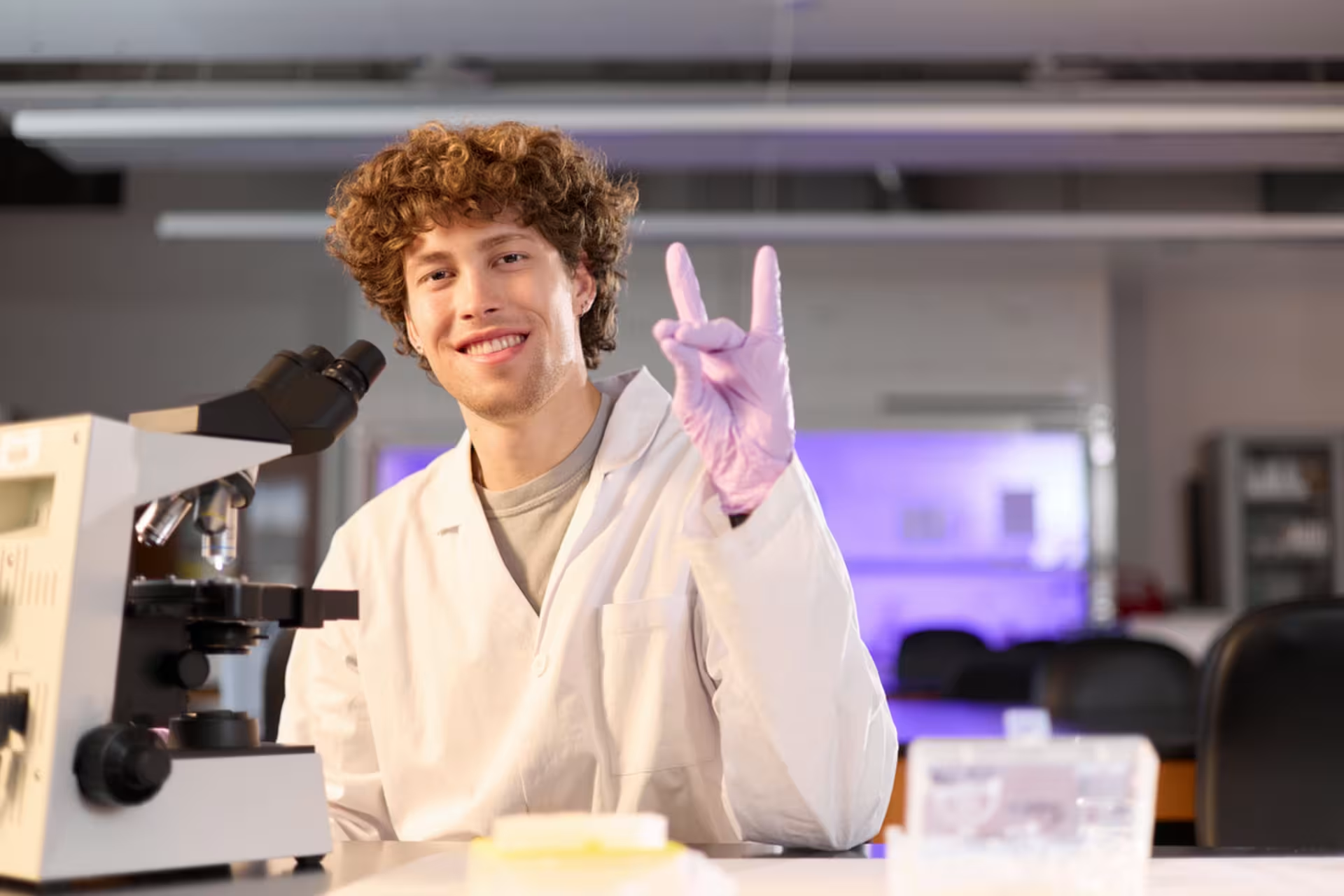Read time 5 minutes
Published on May 3, 2022
Genes are the building blocks of life, and all living things have a genetic blueprint. The study of genetics, a subfield of biology, is an exciting career possibility for students who are passionate about the life sciences. There is a wide range of genetics careers you could choose to pursue, including those discussed below.
Genetics Careers in Agriculture
When you think about possible careers in genetics, you’ll likely imagine professions that are devoted to the study and promotion of human health. While it’s true that medical genetics is a major area of this subfield, there are many other possibilities to consider.
Agricultural/Plant Geneticist
An agricultural scientist, also known as a plant geneticist or plant scientist, is a professional who specializes in the genetics of agricultural or horticultural plants. (Agricultural plants are those that are edible, whereas horticulture refers to all plants, whether edible or not.) These experts may sometimes have the job title of “plant breeder”.
Plant geneticists or breeders study plants and their genetic traits with the goal of attempting to somehow improve the plants. For example, the goal might be to increase the disease resistance of corn to reduce farmers’ losses, to develop a variety of tomato that is more resistant to drought or to create a variety of potatoes with greater nutritional value. In the case of non-edible plants, the goal might be to enhance a garden plant’s appearance to make it more commercially appealing to home gardeners.
Plant geneticists typically have at least a baccalaureate biology degree. The majority of positions available to these professionals also require a master’s degree and/or a doctoral degree.
Animal Geneticist
An animal geneticist studies the genes of animals to determine which genes might influence behavior, appearance, health outcomes and other aspects of performance. Just like plant breeders, animal geneticists look for ways of improving and increasing the incidence of desirable traits through tasks such as the following:
A significant portion of all animal geneticists specialize in working with livestock, such as cattle, poultry and pigs. Their goal might be to increase milk production in dairy cows or improve the resistance of poultry to diseases. In addition to animal production facilities, you’ll find animal geneticists working at zoos, hatcheries, research labs and pharmaceutical companies.
Like plant scientists, animal geneticists are required to have at least a bachelor’s degree. Most positions may also require a graduate degree, particularly the senior-level research positions.
Careers in Genetics That Focus on Forensic Science
Forensic science is at the intersection of law and science. Forensic science professionals play a crucial role in the criminal justice system. They are responsible for analyzing evidence, which may identify a suspect, link a suspect to the crime, identify a victim and determine how a victim died.
If you’re interested in the behind-the-scenes work that helps keep communities safe, you might consider becoming a forensic science technician who specializes in genetics. Forensic science technicians are responsible for collecting and analyzing evidence, ranging from bodily fluids to fingerprints to firearms to drugs. These professionals perform biological, chemical and microscopic examinations on evidence to determine whether a suspect can be tied to criminal activity.
These experts typically remain in the lab and do not generally venture out to crime scenes to collect evidence. At larger crime labs in major metropolitan areas, a forensic science technician may work exclusively with one subfield, such as DNA analysis. In contrast, at smaller crime labs, these professionals might need to wear multiple hats.
A graduate degree isn’t necessary for pursuing an entry-level position as a forensic science technician, although some of these professionals may choose to earn one. Newly hired professionals usually go through a period of on-the-job training. They may also opt to work toward a voluntary certification after gaining some work experience.
Genetics Jobs in the Healthcare Field
If human healthcare is your passion, then you’ll want to explore genetics careers that focus on medical genetics. The subfield of medical genetics involves the study of genetic diseases and conditions. In seeking to learn more about genetic diseases, medical genetics experts look for new or improved diagnostic capabilities, health management and treatment options for patients.
Genetic Counselors
When individuals are expecting a child or thinking about trying to conceive, they might consult a genetic counselor to learn about the potential risk of hereditary issues. These include birth defects and genetic disorders. Genetic counselors are trained to handle the following responsibilities:
Although working with expecting couples and those thinking about conceiving is a major component of a genetic counselor’s job, they may also work with individuals who are concerned about genetic risks as they age. For example, some genetic mutations may predispose a person to developing a disease such as cancer. In these situations, the genetic counselor will identify and analyze the patient’s potential risk and inform the patient accordingly.
Aspiring genetic counselors must earn a bachelor’s degree, such as a biology degree. They will then need to earn a master’s degree that focuses on human genetics or genetic counseling. Additionally, many states have licensure requirements for these professionals.
Clinical Laboratory Geneticist
If the job of a genetic counselor appeals to you, but you aren’t sure you want to work directly with patients, you might consider pursuing a position as a clinical laboratory geneticist instead. These professionals primarily work in genetic testing labs. Here, they perform and interpret genetic tests for patients.
A clinical laboratory geneticist may specialize as follows:
The pathway toward becoming a clinical laboratory geneticist is more lengthy and challenging than that of a genetic counselor. Clinical laboratory geneticists are generally expected to hold advanced degrees. Some of them hold PhDs, although the majority is expected to have completed medical school and earned a physician’s license, followed by fellowship training in genetics.
Earning an Undergraduate Biology Degree
Although some careers in genetics may require a graduate degree and related work experience, other genetics careers may be pursued with just a bachelor’s degree, such as the role of forensic science technician. Regardless of your specific genetics career plans, you can get started working toward your dream job by enrolling in an undergraduate biology degree.
If you think you might like to focus on medical genetics, it’s particularly advantageous to select a biology degree with a pre-medicine focus. This will allow you to pursue a placement in medical school if you wish. Even if you don’t plan on attending medical school, a biology degree with a pre-med specialization can be advantageous for opening more career possibilities in the genetics field.
You can prepare to pursue these and other exciting genetics careers when you become a STEM student at Grand Canyon University—a private Christian school. Apply today for enrollment in the Bachelor of Science in Biology with an Emphasis in Pre-Medicine degree program, which uses a well-rounded curriculum that touches on genetics, biochemistry, biological sciences and other core knowledge areas. Click on Request Info above to find out how you can join our dynamic and supportive learning community in the heart of Phoenix.





